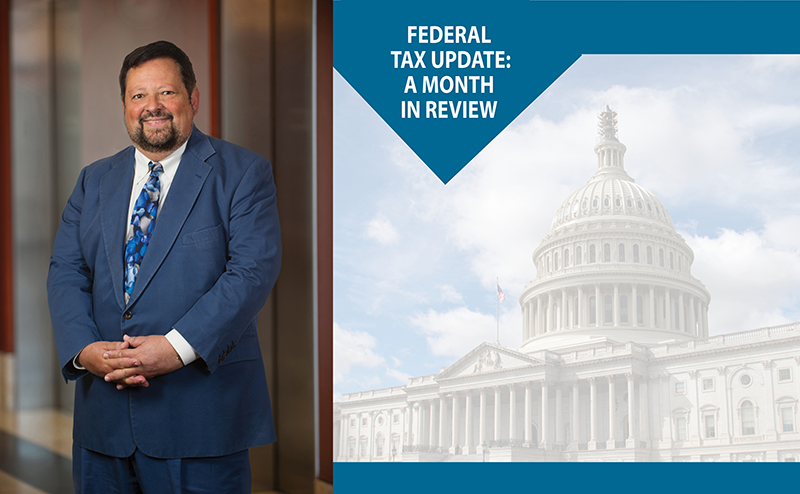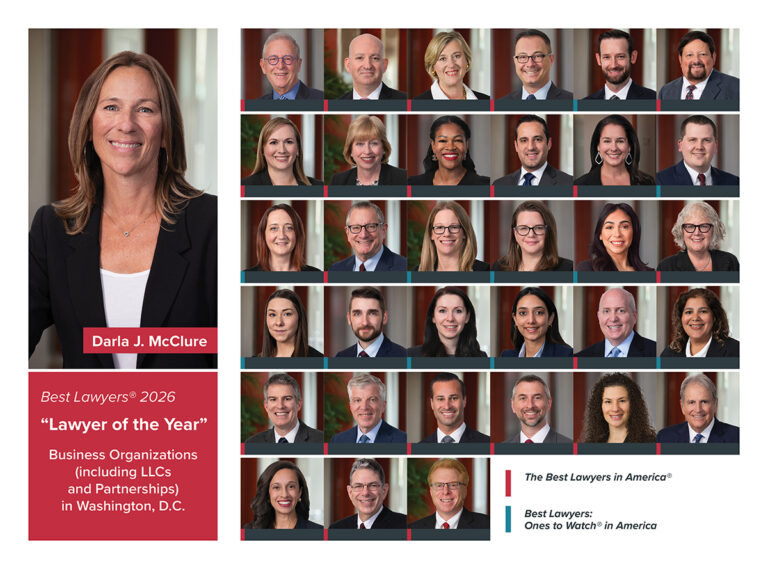May 1st, 2022
April Federal Tax Update
Posted in: Tax Law Tagged: David S. De Jong
Author: David S. De Jong

INDIVIDUALS
In Doherty v. Turner Broadcasting System, 129 AFTR2d 2022-________, a District of Columbia Federal District Court ruled that an employer not only did not willfully file fraudulent tax forms but in fact complied with DC law which permitted alternatives to workers compensation for on the job injuries; the employee got paid initially under a short-term taxable disability program before the taxfree workers compensation program took over payments.
In Sestak v. Commissioner, TC Memo 2022-41, the Tax Court denied a deduction to a former State Department official who had pled guilty of bribery and had agreed to divest himself of proceeds invested in real property in Thailand, the Court stating that the allowance of a loss deduction for divestiture would undermine the impact of bribery of a government official.
In State of New York v. Yellen, the US Supreme Court declined to review the holding of the Second Circuit Court of Appeals at 128 AFTR2d 2021-6202 permitting the limitation on the deduction of state and local taxes to stand.
In Scholz v. Commissioner, TC Summary Opinion 2022-5, the Tax Court denied charitable contributions and pre-2018 employee business expenses for lack of substantiation and, in the case of the business expenses, for lack of a business purpose for out of state trips to prospective cities where the taxpayer thought she might like to live in the future.
In Information Letter 2022-5, IRS proffered that “wellness” expenses do not automatically qualify as a medical expense deduction, maintaining its longtime position that the expense must be tied to treatment of a specific disease, illness or mental defect; IRS suggested that the expense should not be deducted if it were incurred as a benefit to general health.
RETIREMENT AND ESTATE PLANNING
Proposed Regulations under Code Section 430 revise the mortality tables for determining the present value of a future benefit under a defined benefit plan and set forth a methodology to update the tables in future years.
Proposed Regulations under Code Section 2010 reiterate that 2018-2025 gifts will generally remain nontaxable even if larger than the post-2025 exemption at death; however, that rule will generally not apply to pre-2026 transfers that are ultimately includable in gross estates.
BUSINESS
In Mihalik v. Commissioner, TC Memo 2022-36, the Tax Court agreed with IRS that a retired airline pilot who continued to receive free travel for himself and his family on a standby basis had to report income as to the value of flights taken by family members other than his spouse and dependent children, the Court applying the statutory language as to who can benefit from a “no additional cost service” and determining the absence of a “de mininmis” fringe benefit.
In Aspro, Inc. v. Commissioner, 129 AFTR2d 2022-________, the Eighth Circuit Court of Appeals agreed with the Tax Court that payments made by a C corporation to two corporations and an individual who collectively owned 100 percent of the stock were not consulting payments but were distributions in the lack of any documentation to the contrary.
In Kohout v. Commissioner, TC Memo 2022-37, the Tax Court found that an individual and a controlled corporation had insufficient bases in an LLC in order to deduct losses, the taxpayers unable to overcome their burden to produce documents rather than summaries.
In Pediatric Impressions Home Health v. Commissioner, TC Memo 2022-35, the Tax Court agreed with IRS that nurses working for a staffing agency and paid on an hourly basis were employees rather than independent contractors despite the fact that they could do other work in their off hours, citing the use of terms such as “employed” and “full-time” in their communications as well as the requirement of giving two weeks notice on termination; the Court denied Section 530 relief inasmuch as the workers had been previously treated as employees.
In Redi Foundation v. Commissioner, TC Memo 2022-34, the Tax Court found that an officer of a nonprofit organization who was the sole service provider was a statutory employee and not an independent contractor; the Court also held that section 530 was inapplicable in the case of a statutory employee.
In Letter Ruling 2022140151, IRS denied exempt status as a business league to an organization formed to provide “angel” investing education with opportunities to invest as the organization lacked a common business interest.
In Letter Ruling 202215001, IRS allowed a partnership to make a late section 754 election beyond the extended due date of the return as it acted reasonably and in good faith and got no benefit of hindsight by making the election late.
PROCEDURE
In Metz v. Commissioner, TC Memo 2022-33, the Tax Court concluded that the filing of delinquent returns coupled with a pattern of understating income through concealment along with failure to make estimated tax payments shows a fraudulent intent, the Court imposing a civil fraud penalty in the case of an individual who operated several businesses and did not cooperate in the audit necessitating use of the bank deposit method to reconstruct income.
In United States v. Toth, 129 AFTR2d 2022-________, the First Circuit Court of Appeals agreed with a Massachusetts Federal District Court that an individual willfully failed to file FBAR forms, that the penalty was not excessive and that the penalty is not a fine for which the Eighth Amendment would apply.
In Weston v. United States, 129 AFTR2d 2022-1474, the Federal Circuit Court of Appeals agreed with the US Claims Court that a petition filed in the lower court by mail on the last day and received nine days later was not timely, the Court holding that only the Tax Court of the various litigation forums looks to the date of mailing as the date of filing.
In Pond v. United States, 129 AFTR2d 2022-1483, a North Carolina Federal District Court agreed with IRS that its regulations supplanted the common law mailbox rule and that the taxpayer, who sent a claim for refund by regular mail, could not prove timely mailing when IRS had no record of receiving the return; the courts differed on the issue prior to IRS updating its regulations.
In Boechler PC v. Commissioner, 129 AFTR2d 2022-1489, the US Supreme Court unanimously reversed a decision of the Eighth Circuit Court of Appeals and held that the 30-day limit for appealing a CDP determination to the Tax Court is nonjurisdictional which allows the Tax Court to consider late-filed petitions, the Court saying that a deadline is jurisdictional only if Congress “clearly states” that it is; the Court remanded the case to determine if the taxpayer was entitled to “equitable tolling” for any reason.
In In Re: Golden v. United States, 129 AFTR2d 2022-________, a California Bankruptcy Court went against the weight of recent authority and allowed an individual to discharge income tax liability for a year in which a substitute for return was prepared by IRS prior to the actual filing of the return, the Court noting that financial and family difficulties prevented timely filing, the return was filed within a reasonable amount of time from the extended due date (17 months) and the late filed return reduced the assessed tax.
In a National Taxpayer Advocate Blog, IRS announced that it is now placing the 60-day deadline on any notice setting forth a math error to facilitate a taxpayer challenge to the computation prior to assessment.







